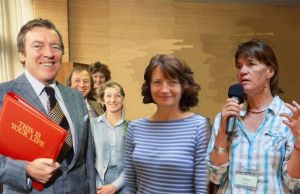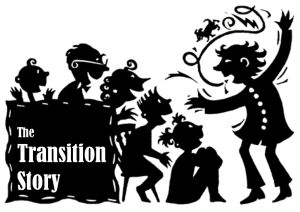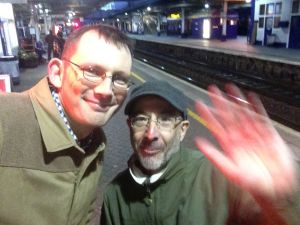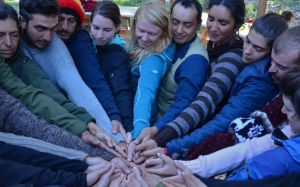17 Dec 2015
It is said in Buddhism that just before his enlightenment, as the Buddha sat beneath the bodhi tree, he was challenged by Mara, the demon, who tried to distract him from attaining enlightenment with desire and fear. Mara demanded that the Buddha produce a witness to confirm that he had in fact reached a level of spiritual attainment and so, the story goes, the Buddha reached down his right hand to touch the Earth, and the Earth responded “I am your witness”. Many images of the Buddha show his right hand touching the earth. Often the other is in his lap facing upwards. The right hand touching the earth is said to represent Skilful Means, and the left to represent wisdom. In the slightly bewildered days following the two weeks of COP21 in Paris, I found this metaphor of “touching the Earth” coming back to me over and again.
While many commentators rushed to post their thoughts on what happened in Paris and its outcomes, on whether the agreement constituted a historic moment or a hollow sham, whether it was a future-changing moment of united political genius, or a meaningless waste of everyone’s time, I haven’t yet done so. There are some particularly good analyses here, here and here. There’s not much I can add to them.
I feel the need, after 8 breathless days in Paris, to sit and reflect, to digest. It feels to me that we find ourselves in a new world. A world where coal lobby bosses now say that, post-COP21, they will be “hated like slave-traders”. A world where, on paper at least, the world is now committed to a 1.5 degree target. The language has changed, the conversation has changed. As Martin Lukacs put it, “the first task is to never let the richest governments forget their rhetoric. Did you say 1.5 degrees? Repeat it back to them as they return to licensing the mines, mega-dams, and monocultures that will render even their paltry emission targets impossible – and then back it up with action”. Indeed. But for me, at this moment in time, I need to touch the Earth.
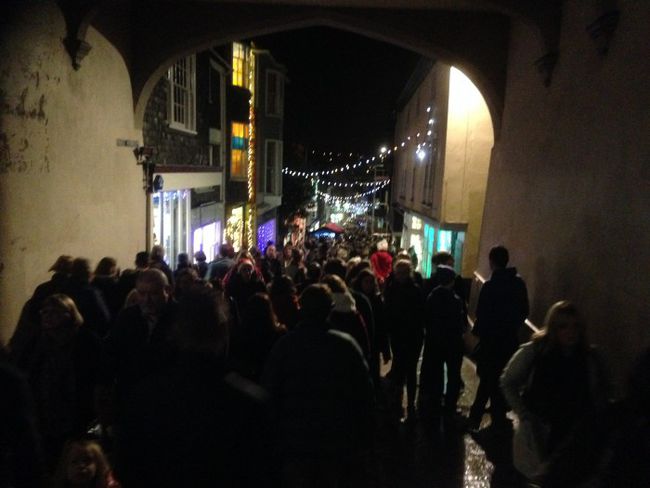
My key Earth-touching moment was at Tuesday night’s Totnes Christmas Market. If you’ve never been, it’s one of the best reasons to live here, when for the 3 Tuesday evenings before Christmas, the High Street is blocked to cars and the streets throng with food being cooked, mulled wine being served, all kinds of music from choirs and rock bands to 6 year-olds with violins and beatboxers, people selling mistletoe. There are stalls, all the shops stay open late, and there are people, lots and lots of people. It’s one of my highlights of the year. It’s the town at its finest.
Coming back to where I live, what I love about it, and the people who make it what it is, are a key part of digesting Paris. My first port of call at the Market is the New Lion Brewery stall, a business I helped found and am very involved with, doing roaring trade (sorry) at the top of the High Street.
I visit the Kitchen Table, a social enterprise very involved with Transition and buy a helping of their mushroom stew made with the brewery’s stout and mushrooms grown using our spent grains by another social enterprise, GrowCycle, who were part of the town’s first Local Entrepreneur Forum (LEF) alongside the Brewery. The LEF that took place in Lambeth was one of our 21 Stories of Transition.
I stop to see my son, a very talented beatboxer, performing with Glorious Chorus, a local choir, a collaboration that works brilliantly, even as the drizzle swirls down in sheets. My journey up and down the High Street is punctuated by meeting endless people, friends who I don’t get to see very often. The Christmas Market is a brilliant place to meet to reconnect.
I stand and watch Beltane Border Morris, a kind of black-painted death metal morris team, who move like Dementors with rhythm. A woman in front of me, after one dance, leaves telling her friend that “they’re a bit too scary for me”. I think they’re brilliant. One of the dancers is the sister of Amber who is part of the Transition Network team. Here they are:
As the Market winds down, I walk home afterwards through the drizzle, down streets whose roofs bear the solar panel proof that Transition Streets brought the people on this street out of their houses and into each others’ lives. I pass the Guildhall, home to the Town Council that declared itself a ‘Transition Town Council’.
As I walk through the rain slicked streets, lit orange by the streetlamps, I feel myself touching the ground. Those long days in Paris, the vast soul-less corridors of Le Bourget, the police snatch squads and false solutions at Le Grand Palais, the sheer thrill of the film ‘Demain’ and its powerful, kind and heart-felt painting of the new world that is so very very attainable, the Human Chain that went on and on and on, all of that starts to land. For most people who felt called to be there, it was a dizzy, adrenalin and coffee-fuelled fortnight where hopes and anger and powerlessness and deep inspiration flowed through our veins. And at least we got more sleep than most of those negotiating inside Le Bourget! There was very little space in which to pause, breathe, reflect.
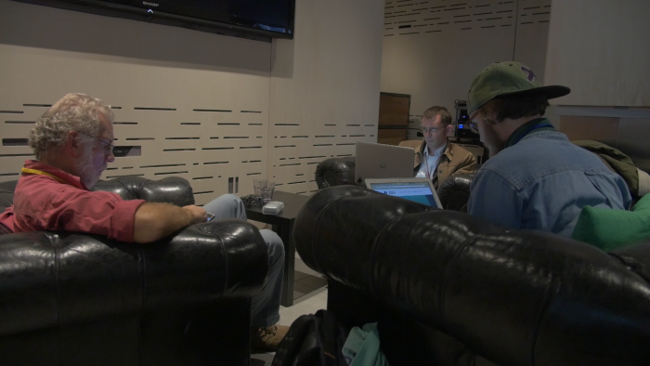
It felt to me like one of the key things we brought as Transitioners to Paris was the idea of creating space to digest. It’s just not OK anymore to dump distressing images, thoughts or information onto people without giving time and a context within which to digest it. It matters so much that as a movement (in its widest sense) we model the world we want to see rather than just replicating the old one, and the number of events in Paris where that didn’t happen was troubling.
So my digestion takes place walking these streets, in the orange-lit drizzle, through the throngs of people, down cobbled side roads. In conversations with my friend Hal and his young family about sleep-deprived nights and his daughter’s sparkly hat. In conversations with my sons’ friends about their plans for college. Each time, I’m touching the Earth, grounding back into why all this stuff matters, into the real world where climate change is already making itself felt (it was, by far, the warmest Christmas Market I can remember) and making the space for digestion. Feeling that it’s OK when people stop me to ask what I think of what came out of Paris to say “I don’t know. I’m still thinking about it”.
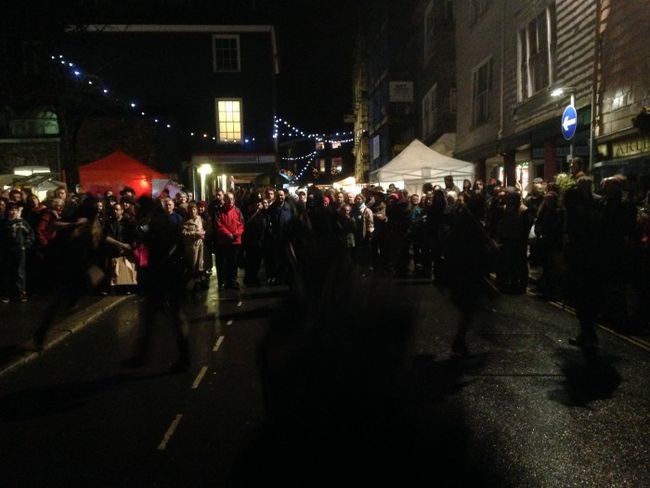
In the New Year, the conversation, the reflection, will begin. What does this new post COP21 world mean for Transition? What opportunities open up? What doors can we now push on? What can we contribute to those discussions about what a 1.5 degree world might look like? Which bit of “back it up with action” can the Transition movement tell stories of, show already in action on the ground? Where are the gaps and what might we do differently?
But for now, we stop, we digest, we touch the Earth. This is the penultimate post here for 2015. The final one tomorrow will be a fascinating interview with our outgoing Inner Transition pioneer Sophy Banks. I’d like to thank you, on behalf of everyone else who has written on this website, everyone at Transition Network, for your support, engagement and good wishes. And wishing you a good break over the festive period and, hopefully, some time and space for you to digest and find some quite time to allow the post-Paris dust to settle.
Read more»
15 Dec 2015
During 2015, two of the key ‘thought leaders’ of Transition have stepped aside to focus on other things. Fiona Ward was the founder and originator of the concept of REconomy, and Sophy Banks has pioneered the whole field of ‘Inner Transition’. Both have played a huge role in making Transition, and Transition Network, what they are. So this feels like an important moment to mark their moving out from Transition, and to celebrate the huge roles they have played in making Transition what it is.
Therefore, rather than me just waxing lyrical about how brilliant I think they both are (which I will do too), I have asked some other people who have worked alongside them for their thoughts too, and if I didn’t get round to asking you, please feel very much invited to add your thoughts in the comment thread below. You could think of it as being a kind of Transition version of the 1970s/1980s British TV show ‘This is Your Life’, where unwitting celebrities were, on one pretext or another, brought into a TV studio where various people from their past then talked about how wonderful they are. So, Fiona and Sophy, This is Your Life (kind of).
So, Fiona first. Fiona was initially involved in Transition Town Totnes, as one of the team who put in place the foundations of what the project went on to become. She was the original ‘Imelda Platt’, the imaginary entrepreneur building an empire based on urine harvesting in The Transition Handbook. She originated and pioneered the REconomy aspects of Transition Network, originally developing Energy Resilience Assessments, then Local Economic Blueprints, co-ordinating REconomy’s international projects, roadshows, blogs and so much more. She is the creator of Transition Streets, the award-winning behaviour change model now being rolled out in the US, Australia, Belgium and elsewhere. Here she is giving one of the many talks about REconomy that she gave over the years:
When I first met Fiona, in a canteen at Plymouth University, she was working for an organisation which was providing her with a stepping stone out of the corporate world where she had worked, running large projects in the private sector. As she later wrote, “after realising that these kinds of transformations weren’t generally what served the greater good (or my own), I moved from London to South Devon in 2006 just as Transition was coming into being – a fantastic piece of good timing!” Fantastic timing for the rest of us too… It was at this time that I met her, and shortly afterwards she came on the Skilling Up for Powerdown course I was running, and was very soon deeply immersed in the creation of Transition Town Totnes, and subsequently the Network.
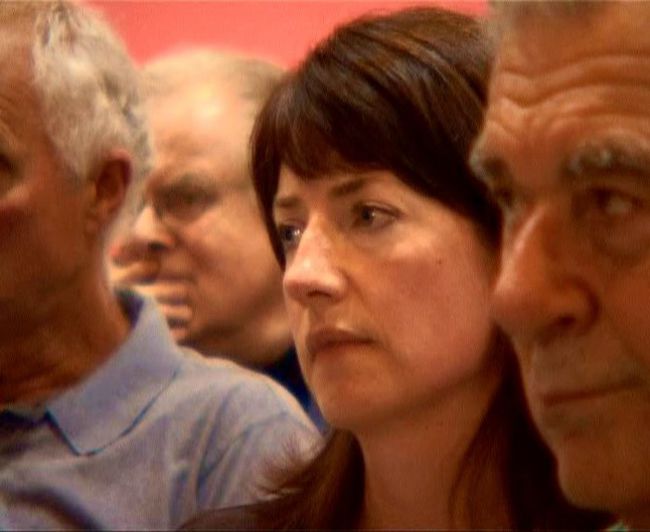
For me, working with Fiona has always been a joy. Infectiously funny and kind, consumately professional, while always brilliantly holding her work/life balance in a far more boundaried way than the rest of us. She brought a degree of expertise with a spreadsheet that, for me, is worthy of a Nobel Prize. The thing I will most treasure about having the privilege of being around Fi has been watching the personal transition she has been on since she moved to Totnes. As she has undertaken her own inner journey, making real space in her life for stillness, for exploration of life and what it’s all about, for contemplation, she has glowed, and brought a calm and a focus to conversations and meetings. She leaves Transition Network to spend more time supporting the wonderful Caring Town Totnes project, and to walk her dog Rosie along the River Dart. So she hasn’t gone far, more of a move sideways than a move away, but with the REconomy mantle now taken up by others, it’s great that we are pausing to celebrate her in this way. So what do others have to say about Fiona?
Peter Lipman, Chair of Trustees at Transition Network, said of her:
“Fiona has not only steered and project managed REconomy absolutely brilliantly from its early beginnings to the successful roll-out across 10 countries, but she’s also always played a full part in doing the more strategic analysis and thinking underpinning REconomy, as well as in helping to hold TN and the movement more widely. Her legacy is a thriving REconomy programme across the wider movement, and a modelling of efficient and thoughtful programme nurturing and delivery”.
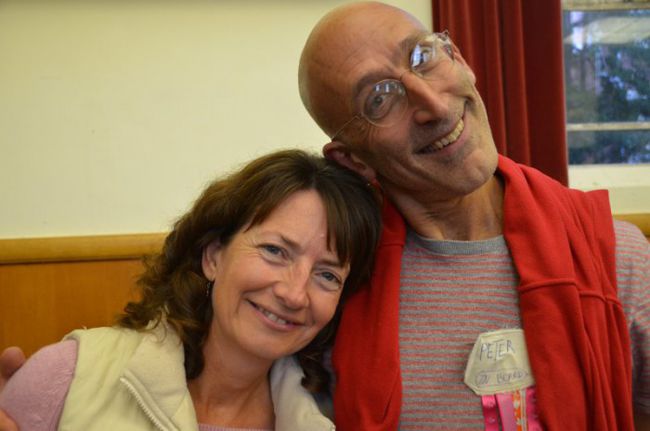
Cristiano Bottone, co-ordinator of the Transition Italy Hub, shared his thoughts on working with Fiona:
“Fiona is another of those incredible, extraordinary people one happens to find in the Transition circus. We met in person only few times but I think we did quite a lot together, she is so professional and patient and the evolution of the REconomy Project, often in very difficult conditions, is a sign of her ability and resilience and big heart. As far as I know she’s now going to follow what she feels more important at the moment to enrich her life so I’m happy and I really wish her all the best and new exciting adventures”.
Ben Brangwyn, Transition Network’s International Co-ordinator, points to three big things he learnt from “the force of nature named Fiona Ward” for which he is grateful:
“First, as she stepped resolutely along the unpredictable and iterative path that led to REconomy, she’s taught me that “failure” is just another way of describing a little stumble on the pathway to success.
Second, with her many organisational contributions, she’s proven that scarce time and resources doesn’t have to get in the way of being “on time, on budget, top quality” – her superpowers around staying focused and deflecting distractions are truly an inspiration.
Third, the art of asking the right challenging question, delivered with perfect timing and heaps of compassion which shines a light on the shadows that many others fear to expose. I’ve experienced her doing that in both work and personal settings and while it can be very unsettling to begin with, it’s always been helpful. During one particularly dark and stormy time for me, her challenging question really helped me, as did the hand she offered as I stumbled back onto solid ground. I always be especially grateful for that. I feel very lucky to have worked with her, and luckier still that she’s a friend”.
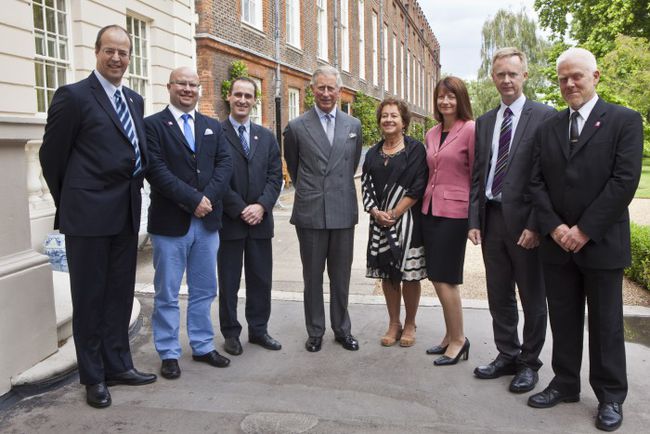
Annelieke van der Sluijs, co-facilitator of the International Inner Transition group, wrote of Fiona:
“I have known Fiona since September 2014, when Portugal joined the second generation of the international REconomy group. Although I have only “met” her 6 times by Skype, it feels as if we have been working together much longer. She was very much with us new starters, it was very supportive to feel how much she trusted and promoted all of us to find our particular way, tuning with our local context.
She gifted us a head start in our 1YT project, bringing us from zero experience with REconomy to a level of basic understanding that helped us shape our project, that is now actually happening, in its pilot phase. I was impressed by her fluency in facilitating our meetings, especially her skillful questioning. She gave us all the space to tailor meetings to our needs, bringing opportunities for sharing and cross-polination to the surface and relating to work already done.
Thanks to Fiona, the international REconomy community has come alive with very little coordination effort of hubsters. With all of us so busy in our local projects, I doubt of we would have managed to connect without that support. We now have basic conditions to continue this sharing through the personal connections, and her inspiring example on how to “tune” our continued collaboration”.
Sarah McAdam, Transition Network’s Delivery Director, added:
“Fiona brought rich and varied skills and experience into the Transition Network team and has been impressively open to learning and change throughout her time with the organisation. It’s been great to see her support the spread of REconomy ideas and approaches across the UK and internationally – enthusing people with a sense of what’s possible, helping build confidence and encouraging practical action while really understanding the need for groups to go at their own pace and find the right focus for their particular place. In an organisation with a leaning towards creative chaos, I’ve really appreciated Fiona’s love of structure, attention to detail and commitment to good quality delivery alongside the significant emotional intelligence and integrity she brought to her role. It was a pleasure to work with her and I’m really looking forward to seeing how the Caring Town Totnes project develops with her on the team”.
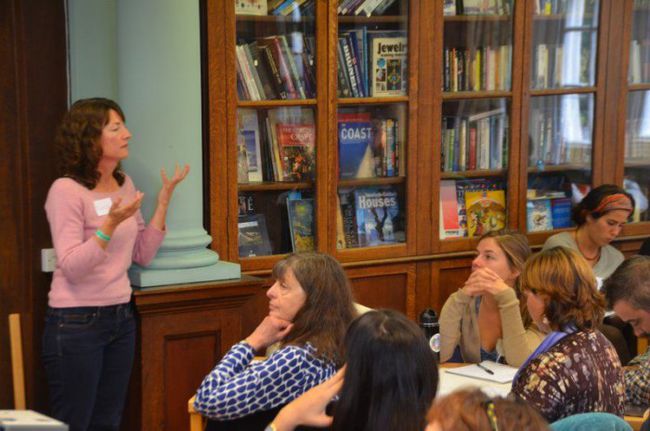
Tony Greenham of the RSA and Director of Transition Network wrote:
“Those who remember the original 12 Steps of Transition might recall the moment when we discovered that those 12 steps just took us to the starting post of transition, rather than the finishing line. One of the most important elements to emerge from this was the ambition and determination to shape a new kind of economy in the places where we live and work. One where businesses are not just ethical, but promote local prosperity, right livelihood, and social and environmental justice. One where new voices can be heard in local economic planning that challenge the dominant ‘growth at all costs’ narrative. Fiona has championed this mission since the very beginning and under her leadership Transition Network has gained considerable recognition for its REconomy work demonstrating that a new approach to local economic development is both necessary and desirable. The rapid spread of this work outside the UK has been brilliantly supported by Fiona and is testament to her immense contribution to the transition movement.”
Josué Dusoulier is one of the founders of the Réseau Transition.Hub in Belgium and part of Transition Ath, and he wrote:
“Fiona is one of the best figures of the Transition in action. From the Transition Streets to REconomy, and today in Caring Town Totnes, she embodies the exemplary in action and gives a lot of inspiration. I had the chance to meet her several times and to get to know her a bit more. She is extremely authentic, friendly and accessible. A model for every person who wants to go into action. I am sure she will continue to inspire us beautiful projects… Fiona thank you and goodbye!!!”
Anna Lodge, who worked with Fiona on the communications aspect of REconomy, wrote:
“My strongest early memory of working with Fi was her patience as I asked her about 100 questions about REconomy: Where it had come from; where it was going; and what might offer in the future? She answered each question with such honesty and openness to the potential to do more of what had worked before, and what could be better. There was a real sense of how much she cared about the work she did but also the room for others to support and take that further within their communities and contexts. The space and narrative she has created for those interested in enterprise and economy within the Transition movement is a massive legacy – felt in Transition Initiatives around the UK and the world. To give space to others is humbling but also what it is all about if local economies are to shift, in the individual ways they need to”.
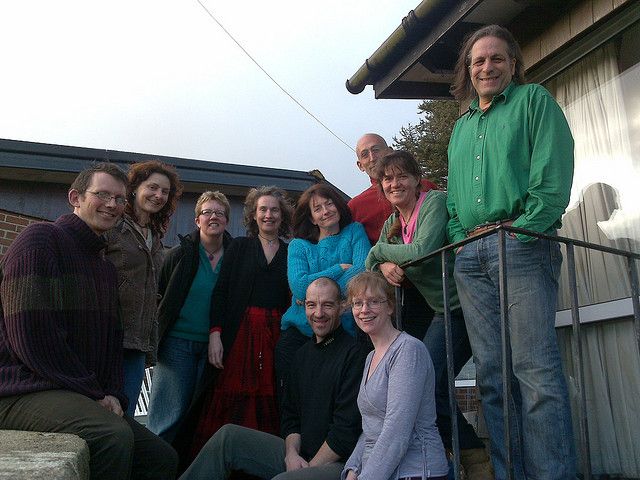
Naresh Giangrande, one of the co-founders of TTT, said of Fiona:
“She is so bright and super efficient. I remember her as Queen of the Spreadsheets. I thought I was good until I met her. She is also so caring and personable on top of that efficiency and very easy to get on with. I like her attitude and competence. She can turn an idea into a doable project in the blink of an eye or so it seems. I am sure it is also hard work. I like how she has allowed the work she does done to change her and change her fundamentally as a person. She is a very different soul than when she tripped up and started working at TTT. There are many impressive things about her but to change so fundamentally at a very personal even soul level, is very impressive indeed”.
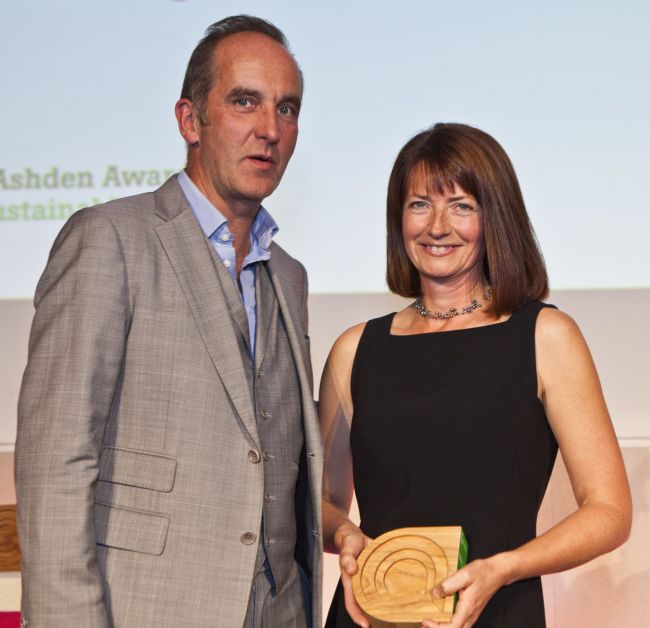
And so to Sophy. Sophy moved to Totnes around the same time I did, called by a sense that she had some work to do but not yet sure what it was. First time I met her was when she and Hilary Prentice came round to my house to discuss the idea of a Heart and Soul group to explore the inner aspects of Transition. From that came the Heart and Soul group and what then gradually evolved as the model of Inner Transition, something she has then blogged about and taught for several years. Meeting people who have done the Inner Transition training is often to meet people who have spent years searching for the missing piece of their jigsaw puzzle and who have finally found it.
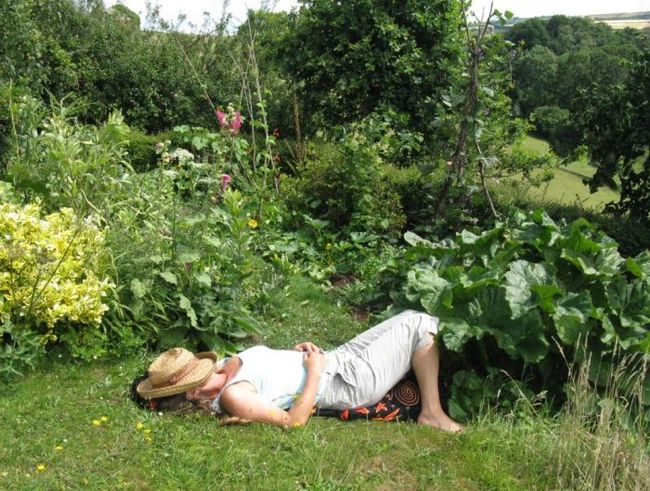
As she wrote for her profile on the Transition Network website, “Transition finally brought together my love of football, engineering and inner work in its comprehensive and systemic approach to creating healthy and joyful communities”. Working alongside Sophy as she developed her ideas and wove them into the DNA of Transition Network hasn’t always been easy. She and I sometimes found ourselves acting out polarised roles, somehow embodying opposing perspectives, but the reality was one of a deeply respectful relationship. And she was usually right.
I have learnt so much from Sophy, her insights, her wisdom, her ability to draw from a vast pool of skills and knowledge but to translate those insights into something easy to grasp, easy to understand. It’s a rare skill. And she’s bloody good at it. Her work brought a depth to Transition that wasn’t there in its original inception, or rather the need for it was there, and a vague sense of it, but Sophy filled in the blanks and took it somewhere else. We all owe her a deep gratitude. As others say below, her work is now so woven into how Transition Network, and Transition initiatives more generally, operate, that the DNA is changed for good. That was an incredible gift, incredible work, but work that takes a lot out of you and is hard to sustain, as we’ll hear in an interview with her tomorrow. Thank you Sophy.
In the video below she explains what Inner Transition is:
So what do some of those who have worked with Sophy want to share about that experience? Tony Greenham wrote of her:
“In both my professional and personal life, I often talk about Transition Network. Perhaps the feature that I find myself advocating more often than any other is the conscious balancing of ‘inner’ and ‘outer’ transition. Over the 8 years or so I have been involved with the Transition movement we have seen corporations and other large bureaucracies discover mindfulness, attempt more participatory group working, and even posit the revolutionary idea that you should be able to bring your whole self to work. This has only served to emphasise to me how much Transition has remained at the frontiers of exploring what organisations and groups look like when ‘being’ is balanced with ‘doing’, and when our emotional journey together doesn’t get drowned out by gantt charts. This is a work in progress to which many have contributed, but without any doubt we would not have travelled as far as we have without Sophy’s insight, inspiration and leadership.”
Annelieke van der Sluijs wrote:
“Since meeting her at the Hubs meeting in Copenhagen in 2014, she has been a constant inspiration. I deeply admire and value how she has been the driving force bringing Inner into the core of Transition, her deep search to understand more of the process of change towards more healthy human culture, and her ability to share her learning.
What most touches me in her, is her way of living Transition. I love the blend of generosity, gratitude, compassion, creativity, deep knowledge and grounding, humanity, curiosity, openness, inclusiveness, humour and vulnerability that emanates from her presence, and that is so contageous to start/go on oneself, no matter how rocky the path.
My heart was singing when I heard Inner folks from 5 continents expressing their gratitude towards Sophy in our last International Inner Transition calls. All of them speaking about the significance of her presence and work on themselves and Inner in their country. Sophy connected us, and I am happy to know that much of what she has sown found fertile ground in me and so many Transitioners around the world. We, her “inner” children, will miss her and feel at the same time equipped to take her work further”.
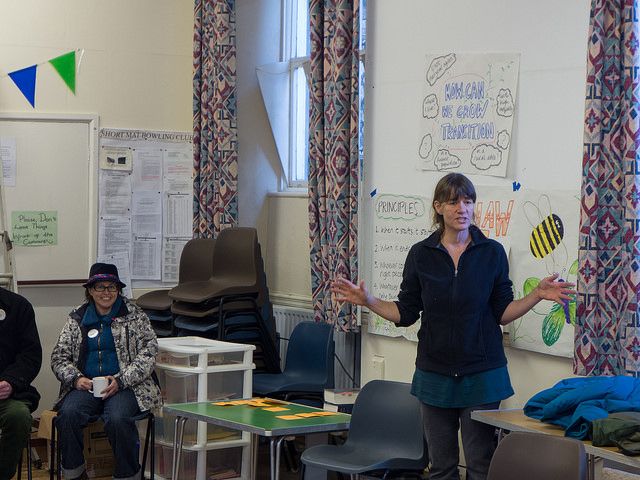
Peter Lipman, said:
“Sophy brought a brave and incisive wisdom to articulating the need to pay consistent attention to the balance between inner and outer work, both in practice within TN and in our strategy and approach. She took on the draining role of questioning a dominant paradigm and stayed true to that despite all of the effort it takes to battle against the status quo. She has brought this to training, to inner work and to organisation care as well as thinking about the transition movement more generally. Her legacy is that TN, and the transition movement, is literate about inner work, and the dangers of doing not being balanced by being – and so far better able to choose how we behave from a position of some understanding and ability to reflect on our patterns and assumptions”.
Cristiano Bottone wrote:
“Talking about Transition, Sophy and Naresh are for me the equivalent of mummy and dad, they came to Italy for the first Transition Training in Monteveglio, I was sleeping on the floor of their new house in Totnes for the first, epic international Train the Trainers. I have no words to say how important and qualifying and enriching was to have Sophy as a guide and companion for this prodigious Transition experiment we are all living. After meeting Sophy and Naresh I decided to steer my life towards a completely different destination. So what I can say, Sophy may step out of TN but she will never be out of my heart or out of my Transition”.
Sarah McAdam adds:
“Sophy was my route into Transition and I will always be hugely grateful to her for introducing me to the movement and to Transition Network as an organisation. And I know I’m far from alone in that – I often meet Transitioners from all over the world who talk with passion about the life changing impact of a course taught by Sophy and Naresh or one of Sophy’s workshops or of hearing Sophy speak about Inner Transition. I’ve greatly valued her ability to step back from the immediate – whether it’s a meeting that’s got stuck, or some difficult personal dynamics or a rushed decision – and to identify the underlying issues, the tension that needs to be named or the opportunity that the rest of us are overlooking in our urge to get on and do something. There are innumerable aspects of Transition Network’s output and ways of working that are deeper, richer and a lot more impactful because of Sophy’s input. She has courage, wisdom and a great ability to find practical and accessible ways to help people get in touch with the inner dimension of Transition”.
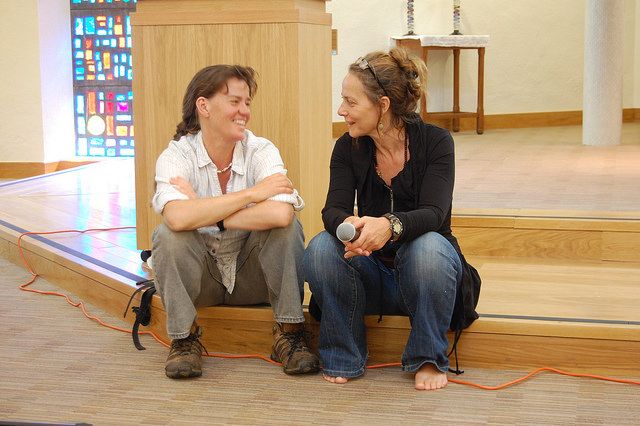
Naresh Giangrande, who as well as being the co-creator of Transition Training with Sophy, is also her partner, wrote:
“What to say. She has brought so much to both organisations we worked together in. Both the ability to engage with ideas and at a cognitive level and also at an emotional, or soul level that is what is so impressive with Sophy. She has the ability to talk with engineers as well as psychotherapists and also spiritual leaders. I had the opportunity to witness a kind of spiritual sparing match (very good natured, nothing like daggers drawn) between her and Satish Kumar and my fantasy is that he came away bemused and a bit non-plussed that a woman who he has known for a long time could match or even surpass him in his field of expertise. She has the ability to cut to the most important part of any issue, personal dispute, project plan or group interaction. I feel when I work with her that I am in safe hands, competent hands, and also caring hands”.
Ben Brangwyn said:
“Aside from Sophy’s humour, emotional honesty and jaw-droppingly expert facilitation, I feel deeply grateful for her deep commitment to bring both gender awareness and Inner issues into the heart of how we work here at Transition Network. Sometimes that’s been a rocky road, other times it’s been smooth – for sure the walls of prejudice and oppression from so many centuries of patriarchy don’t get breached without a few bruises.
Reflecting on Soph’s influence on me, I’d say that of all her gender and Inner insights, probably the biggest one is helping me understand how to apply systems and field thinking to people at all levels of scale – personal, family, group, organisation, and societal, and to see how disfunction in one can manifest in another. That awareness has served me massively in so many work, family and social settings,
Probably the best way to say thanks for all that is for me to keep an iron grip on my intention to honour her contributions around Inner Transition and do my merry best to integrate them into my work and my interactions at all levels”.
Josué Dusoulier wrote:
“Sophy, a very big thank you !! I saw you for the first time in 2010 in the film ‘In Transition 1.0‘, when I discovered the Transition movement. Then we met in 2012 in London, and some other occasions such as “train the trainers”, the Inner Transition training and group, the Hubs meeting or at the 2015 conference… That is, you accompanied my transition closely… and today, the words that come to me are these ones : “Will I meet you again? How to thank you for everything you have given to me personally and to the Transition movement in Belgium and in the world ?” People says that nobody is irreplaceable… but no one will remove the trace you left for the Transition, neither the one that will always remain in my heart. Good bye and thank you again!
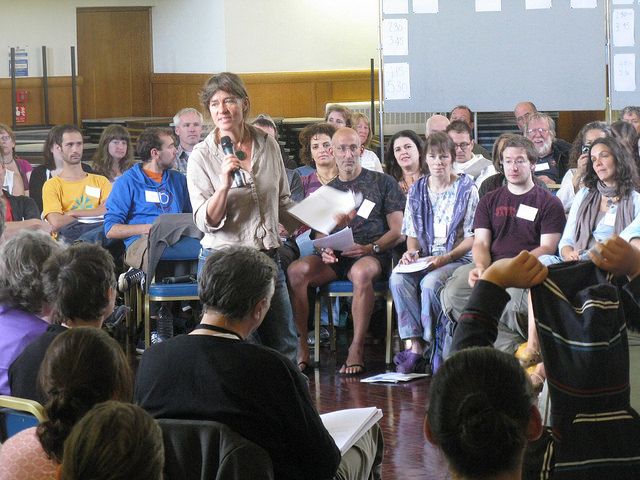
We wish them both the very very best in their future journeys. Please feel invited to share any reflections or thoughts below. We’d love to hear them… To close, I’ll let Sarah McAdam have the final word:
“With both Fiona and Sophy, it has been really interesting to work with them through the process by which they have stepped back from their respective roles within Transition Network. In a movement where it can be challenging for people to let go of projects or groups that they have founded, both Sophy and Fiona provide us with interesting role models. It feels really sad to lose them from the organisation, but I love the fact that they each identified that they had reached the point where it was right to move on and then put great care and attention into leaving the team in a way which provided continuity while opening up exciting spaces for new people to occupy”.
Read more»
11 Dec 2015
Continuing our exploration of the Transition Story project, we asked different National Hubs for their reflections on the blog that opened our theme on the Transition Story. Today Cristiano Bottone of Transition Monteveglio and the Transition Italia Hub shares his thoughts:
“At the Paris COP21 we’ve seen heads of State, one after the other, declare their understanding of the reality of climate change, saying that it is man-made, linked to fossil fuel consumption and so on. That’s quite a step forward, already reflected in public opinion and in mainstream media coverage of the topic. On the other hand, statements made concerning the consequences, urgency and radical nature of required actions are still rather vague and indeterminate. As I write this, COP21 has only just begun… so wait and see.
Time passes, the world evolves, but things have not, in my opinion, changed to the point of requiring changes to the essential elements of the Transition narrative, not yet. To the best of my knowledge, Transition is the only context in which causes and consequences are narrated based on solid sources, in a systemic approach (everything is connected) and taking into consideration the psychological and social consequences of presenting such information. In my experience, this is the approach most likely to produce a reaction proportionate to the problem, whether action then takes place on the personal, family, local, regional, practical or political, national or international levels.
I do not think we should stop talking about peak oil, resources, climate change: rather I think this is as urgent as ever. With a house on fire, shouldn’t we worry about putting out the flames before thinking of how to decorate the living room? At the same time, of course these are not the only things we should be talking about nor the only entry way for people to acces Transition (they never have been). Of course we can facilitate a transition by talking about food, gardening, communication, social justice, democracy, schools, love… (it’s what we’ve always been doing, isn’t it?). I believe the most important factor is to always respect the needs and feelings of other people, offering safe spaces in which to acquire correct information when they are ready for it, never forcing or imposing.
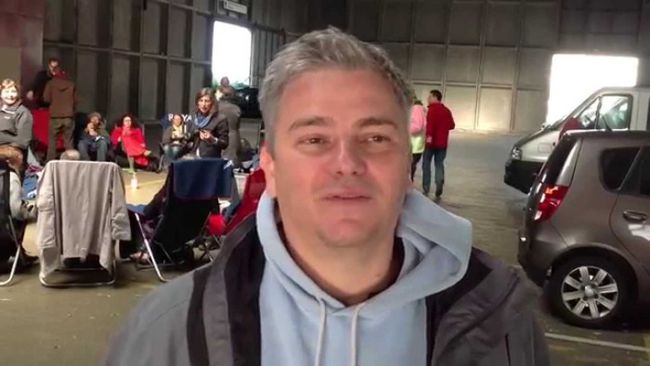
A person interested in facilitating or getting involved in a transition process needs to be aware of the overall scenario, even though we know it is a heavy burden to carry. Without this awareness, we will simply not do all that is necessary; we will not choose the appropriate scale or timeline. Without this knowledge, we will not be able to communicate at a deep enough level with enough human beings in a short enough time. The key for me is not to inform in quantity, but in quality and diversity. That is, to supply information to the right nodes of social networks, activators and disseminators, and make sure we get enough density, ensuring that these nodes are close enough to guarantee frequent interaction (in my experience, this seems to work very well). I think it would be very interesting to give some thought to which information and which approaches prove most useful and effective in which context.
Maybe this is a false dilemma, we don’t really need to choose, once and for all, what to say and what not to say, but rather offer different pathways and different topics to choose from based on different situations, cultural contexts, moments and so on (and this is in fact what I’ve actually seen happen on the ground in the movement). Which brings me to the need of supporting Transition initiatives in learning how to manage relations and contacts strategically… but that is another story.
Read more»


